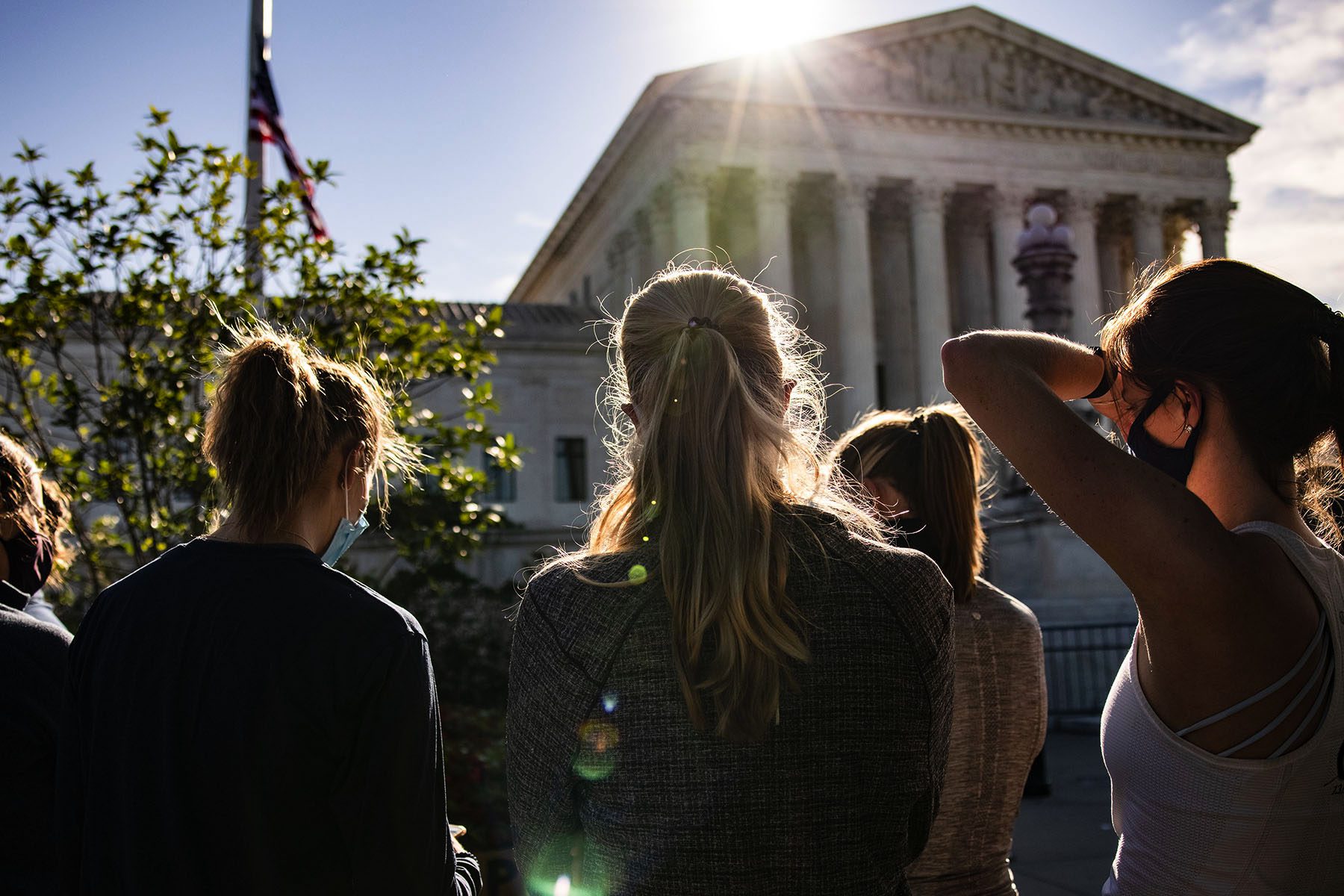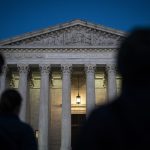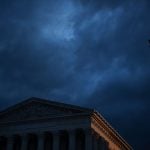A judge’s ruling lifted Senate Bill 8 — the Texas law banning all abortion after the detection of cardiac activity via ultrasound, or approximately six weeks into a pregnancy — for 48 hours last week, but a federal appeals court has put the law back into effect while legal challenges make their way through the court system.
Those rulings were related to the Justice Department’s suit, one of the three major legal challenges to the Texas ban. Last month, the ACLU, on behalf of the abortion provider Whole Woman’s Health, asked for an expedited hearing on their case. And 20 days after SB 8 went into effect, the first civil suit against an abortion provider was filed after the provider publicly said he knowingly violated the law.
As these various legal challenges to halt SB 8 — temporarily and permanently — continue to unfold, The 19th spoke with Julia Kaye, the lead attorney in the Whole Woman’s Health case against Texas, and Rachel Rebouché, the interim dean of Temple University’s Beasley School of Law and an expert of reproductive health law and feminist legal theory. They talked about how to understand the legal landscape around SB 8, including what might happen next, when and to what effect.
What are the lawsuits currently filed against SB 8?
There are three main suits:
- Whole Woman’s Health v. Jackson: The first suit filed against SB 8 was brought by Whole Woman’s Health and a number of co-plaintiffs. This case focuses not on whether the law is constitutional — “it clearly isn’t under almost 50 years of Supreme Court precedent,” Kaye said — but whether the state can effectively insulate itself by outsourcing its enforcement to the general public.
The named defendant in the case is a federal district judge. Part of the question of the suit is whether judges should have the right to process civil cases that emerge as a result of a law that seemingly violates existing Supreme Court precedent. SB 8 has been notable in the way that the actual enforcement of the law doesn’t fall to the state, but rather to private citizens, who have the ability to sue anyone they believe has aided or abetted a person in accessing abortion care after cardiac activity has been detected on ultrasound, or approximately six weeks gestational age.
- United States v. State of Texas: The DOJ filed suit against the state of Texas over SB 8, saying that the law supersedes their ability as the federal government to uphold the Constitution, both through enforcing a law that defies the current Supreme Court precedent created by Roe v. Wade, and by crafting the law in a way that skips judicial review.
- Dr. Alan Braid, a San Antonio-based abortion provider, has been sued by two individuals after knowingly violating SB 8 and publicly admitting to do so in a Washington Post op-ed. The case against Braid will be heard in a county court.
There are also a number of counties in Texas that have also filed suit against the state, asking for the law to be enjoined — or, stopped from being able to go into effect through legal injunction — in those specific counties. These cases are currently working their way through the state court system.
So what’s happening now?
Rebouché said that the DOJ is using a two-pronged approach to making the case that SB 8 infringes on the federal government’s ability to enforce laws.
The first is by underscoring that, per the Constitution, the federal government is the supreme lawmaking body in the United States, and that Texas has infringed on the federal government’s central duty to uphold the Constitution by enacting a law that defies current federal standard.
The second argument is a more “novel” one, Rebouché said: It argues that officials operating in offices like the federal prison system are bound to federal rules and guidelines. This means providing abortion in cases of rape or incest in accordance with the Hyde Amendment. As a result, the DOJ argues, Texas passing a law with no rape or incest exception preempts federal officials’ own authority.
“If a department of corrections facility is applying the constitutional right for inmates to access abortion by applying the restrictions of the Hyde Amendment and allowing for exceptions for rape and incest, Texas can’t tell those officials that people in custody are not entitled to those abortions,” Rebouché said.
Taken together, these two arguments posit that Texas has both a preemption violation on the federal government’s rights and has violated the supremacy clause of the Constitution.
What happens next with the Justice Department’s lawsuit?
On October 6, a federal judge in Austin issued a preliminary injunction against SB 8, which meant the law was temporarily not in effect. Two days later, the U.S. Court of Appeals for the 5th Circuit issued a temporary emergency stay, meaning the the ban could resume. A three-judge panel confirmed that ruling Thursday night, saying Texas’ SB 8 can remain in effect until the appeals case against the law can be heard. Oral arguments are tentatively scheduled for the week of December 6.
The losing party is likely to appeal the case to the U.S. Supreme Court.
What about the case brought by Whole Woman’s Health? Where does that stand?
In their original filing in a federal district court in Texas, Whole Woman’s Health argued that SB 8 is in direct defiance of the legal precedent set by Roe v. Wade and Planned Parenthood v. Casey. The abortion provider also pointed out the chilling effect SB 8 would inevitably create on as a result of the threat of frivolous lawsuits.
The 5th Circuit Court of Appeals cancelled an emergency hearing for this case right before SB 8 was set to take effect. Whole Woman’s Health and their co-plaintiffs then appealed to the Supreme Court for an emergency hearing to enjoin the law before the case could be heard, but were denied. Now, the Whole Woman’s Health suit is waiting to see if the Supreme Court will let them have a hearing before it reaches the highest court.
Unlike the DOJ case, the legal argument being made by the ACLU (on behalf of Whole Woman’s Health) isn’t about federalism, Rebouché said. Rather, the latest petition in front of the Supreme Court focuses on whether Texas officials are the people who should be sued over SB 8 — and whether providers have a right to sue over it.
As Rebouché puts it, the Whole Woman’s Health case boils down to the plaintiffs saying, “We are the right people to sue, we are harmed, and the state of Texas is facilitating this harm.”
The Supreme Court, in refusing to block the law, said that because private citizens are the ones enforcing SB 8 by being able to sue over any perceived violations of the law, Texas officials are not the people who should be named in the suit.
Another legal question that has been posed by the Whole Woman’s Health suit is not only who the defendants in such a suit should be, but who the plaintiffs can be and whether abortion providers are able to assert that SB 8 is causing them direct harm — and whether they were able to make such a claim before the law even went into effect.
The tricky thing here, Rebouché said, is that it’s still not clear whether or not Whole Woman’s Health’s argument that they can sue to enjoin the law holds up. Even though state officials, per the text of SB 8, can’t enforce the law, private litigants still have the ability to take those they accuse of aiding and abetting in abortion to court. Since state courts will then have to determine if there is liability in these cases, the courts are serving as state actors — which Whole Woman’s Health says makes it perfectly fair for the state of Texas to be the defendants in their suit.
It remains unclear if state courts themselves can be the target of a lawsuit, which is why Whole Woman’s Health is asking the Supreme Court to “go to the status quo” — or block the law under precedent — while the federal courts decide this issue.
Kaye said that the 5th Circuit has already said they will not hear the Whole Woman’s Health case until December at the earliest, which is why the plaintiffs have asked the Supreme Court to act on an expedited basis in their most recent filing, including for a briefing schedule that would allow them to consider taking this case on October 29. Should the Supreme Court grant this, the plaintiffs would then ask for a Supreme Court hearing to be scheduled in December. They also note that since the law has been in place for a month, they can show evidence of the harm being done by it.
“There is no opportunity for quick relief in our case,” Kaye said. “But this is still an urgently important question for the Supreme Court to consider at the earliest possible opportunity.”
What is the case that has been filed against a Texas abortion provider?
Dr. Alan Braid wrote an op-ed on September 18 in the The Washington Post disclosing that he had knowingly violated SB 8. Two days later, the first civil suit was filed against him. Braid publicly outing himself — and preemptive securing legal counsel — has been perceived by many as yet another opportunity for the courts to assess the constitutionality of SB 8. (Braid did state in his op-ed, though, that his main motivation was that failing to provide abortion care to the fullest extent of his training felt immoral and unethical to him.)
By having a provider subject themselves to one of SB 8’s civil suits by a private citizen, the case is now set in motion, which could ultimately give a state judge the opportunity to not only determine Braid’s innocence or guilt. Such a suit could also give an opportunity for the courts to determine whether the law under which Braid is being sued is in and of itself constitutional.
“As a practical matter, it may be that eventually a lawsuit against Dr. Braid or another abortion provider leads to a ruling confirming that a six-week ban is unconstitutional,” Kaye said. “But any such ruling wouldn’t happen for months or years.”
However, because of the nature of the civil suit — and it being directed at Braid specifically — any rulings pertaining to it would be limited in scope, Rebouché said. “If the state court enjoins the law because it’s unconstitutional and Dr. Braid can’t be sued, that is a decision that can be appealed and may get to the Texas Supreme Court, she explained. “But for the moment, it will only apply to those parties named, and won’t be applied statewide.”
So without a larger statewide injunction — like the one that could be issued by the federal district court in Austin on October 1 — any changes in who the law affects would only pertain to certain individuals or counties, but not the state as a whole.
Can we expect more lawsuits related to SB 8?
Rebouché said that there could potentially be more suits to come. These would likely be more civil suits filed against providers who had admitted to violating the law. The intended effect, Rebouché said, would be to target metropolitan areas throughout Texas to try to get state courts to enjoin the law in those specific counties.
“Again, this is a patchwork approach, but it would at least apply to providers in those metropolitan areas,” she said.
When does the Supreme Court hear Dobbs v. Jackson Women’s Health? What is the crucial question at play in this case and how might its outcome impact SB 8?
The Dobbs case raises the question of whether or not bans on abortion before a fetus can survive outside of the womb are unconstitutional.
The Mississippi case specifically looks at 15-week bans. Many Court watchers believe that, since the precedent for pre-viability bans is set, the Supreme Court even hearing the case “suggests to people that they are going to bend the viability line as the unconstitutional versus constitutional boundary,” Rebouché said. “They may overturn Roe and Casey altogether.”
Rebouché added that though she personally doesn’t think they will overturn Roe outright, what the Supreme Court may do is say that the question was never about viability, but whether the state is acting reasonably in regulating abortion. The conservative majority on the Supreme Court may say that laws like the one under review in Mississippi are reasonable actions for the state to take.
If this happens, and viability is no longer a benchmark for determining whether a restriction on abortion access is constitutional, “you don’t need SB 8 at all,” Rebouché said. States wouldn’t need to include a civilian enforcement piece to new laws, because there would be no constitutional argument against the state enforcing such a restriction themselves.







